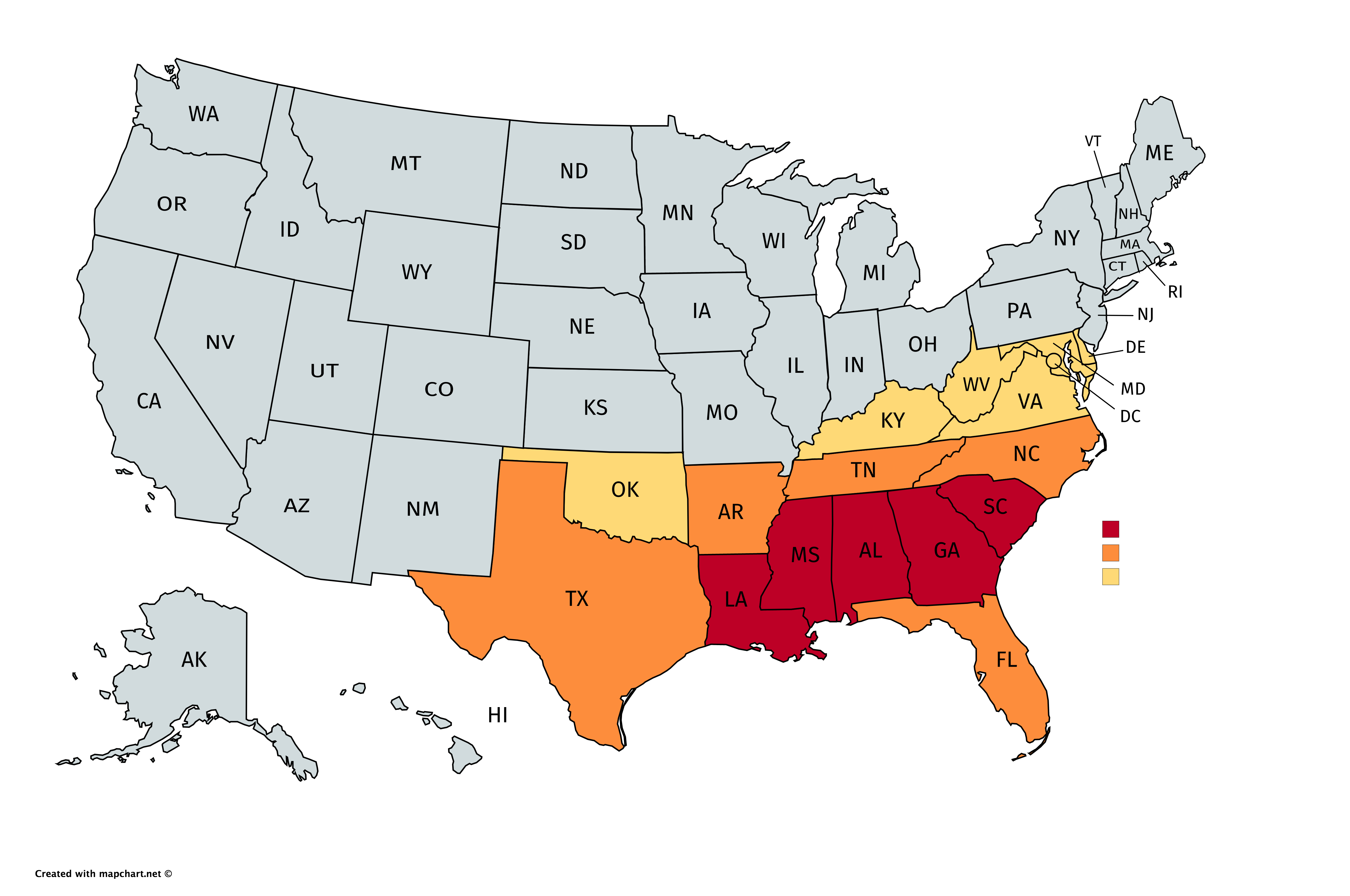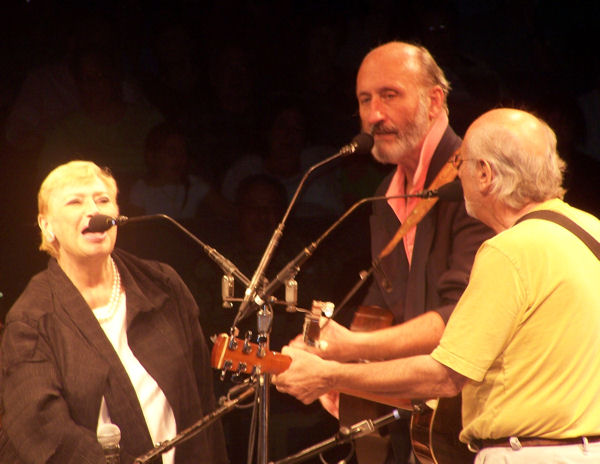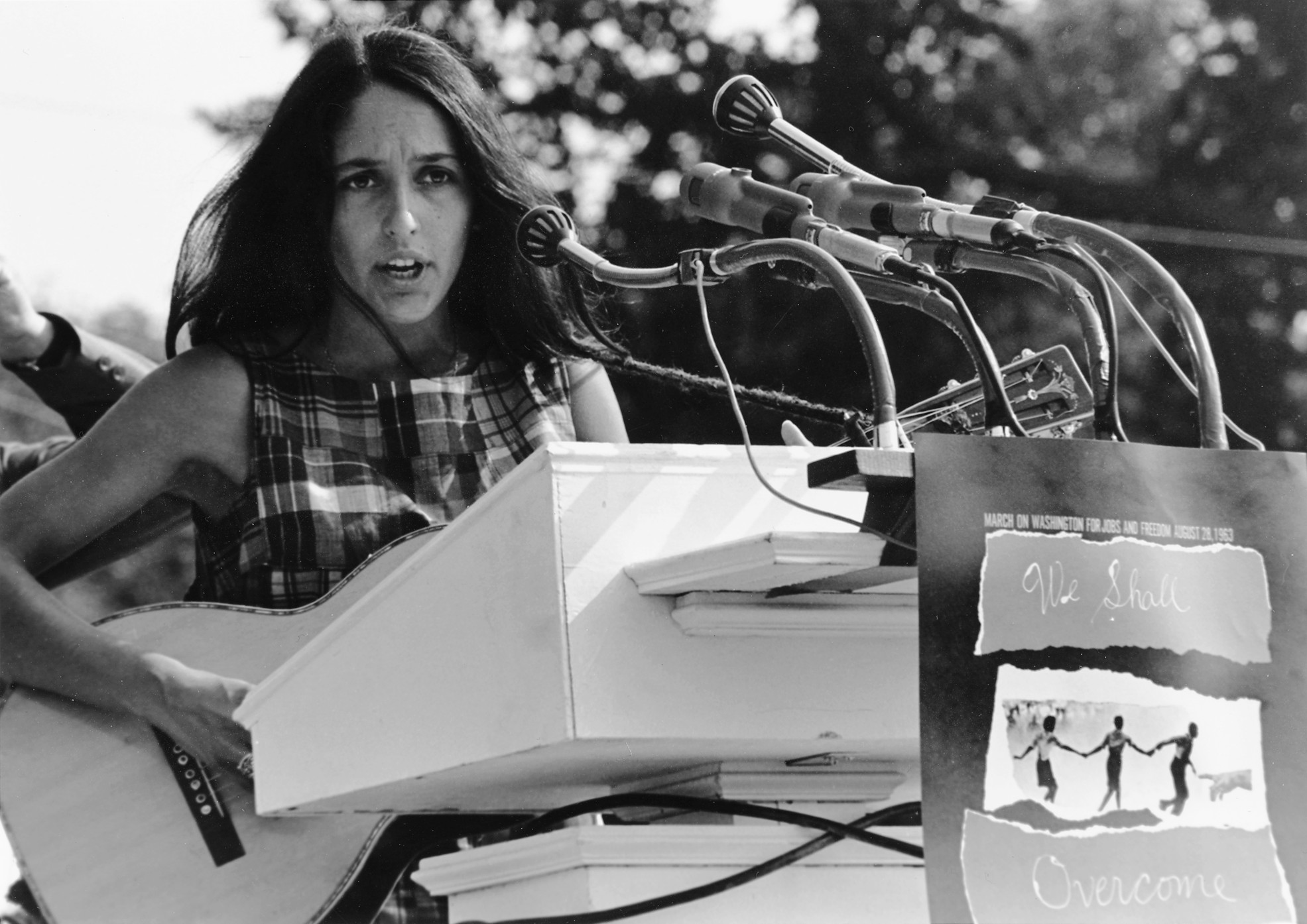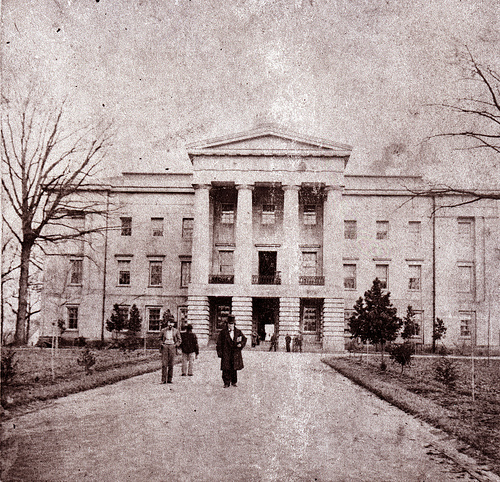|
Freedom Singer
The Freedom Singers originated as a quartet formed in 1962 at Albany State College in Albany, Georgia. After folk singer Pete Seeger witnessed the power of their congregational-style of singing, which fused black Baptist ''a cappella'' church singing with protest songs and chants, their performances drew aid and support to the Student Nonviolent Coordinating Committee (SNCC) during the emerging civil rights movement. Seeger suggested The Freedom Singers as a touring group to the SNCC executive secretary James Forman as a way to fuel future campaigns. As a result, communal song became essential to empowering and educating audiences about civil rights issues and a powerful social weapon of influence in the fight against Jim Crow segregation. Rutha Mae Harris, a former freedom singer, speculated that without the music force of broad communal singing, the civil rights movement may not have resonated beyond of the struggles of the Jim Crow South. Members The original group consiste ... [...More Info...] [...Related Items...] OR: [Wikipedia] [Google] [Baidu] |
Albany State College
Albany State University is a public historically black university in Albany, Georgia. In 2017, Darton State College and Albany State University consolidated to become one university under the University System of Georgia (USG). Albany State University has two campuses in Albany (East and West Campus) and a satellite campus in Cordele (Cordele Center). History Establishment and growth Joseph Winthrop Holley, born in 1874 to former slaves in Winnsboro, South Carolina, founded the institution in 1903 as the Albany Bible and Manual Training Institute. Two educators, Reverend Samuel Lane Loomis and his wife, sent Holley to Brainerd Institute and then Revere Lay College (Massachusetts). When attending Revere Lay, Holley got to know one of the school's trustees, New England businessman Rowland Hazard. After taking a liking to Holley, Hazard arranged for him to continue his education at Phillips Academy in Andover, Massachusetts. Holley aspired to become a minister and prepared ... [...More Info...] [...Related Items...] OR: [Wikipedia] [Google] [Baidu] |
Deep South
The Deep South or the Lower South is a cultural and geographic subregion in the Southern United States. The term was first used to describe the states most dependent on plantations and slavery prior to the American Civil War. Following the war, the region suffered economic hardship and was a major site of racial tension during and after the Reconstruction era. Before 1945, the Deep South was often referred to as the "Cotton States" since cotton was the primary cash crop for economic production. The civil rights movement in the 1950s and 1960s helped usher in a new era, sometimes referred to as the New South. Usage The term "Deep South" is defined in a variety of ways: *Most definitions include the following states: Louisiana, Mississippi, Alabama, Georgia, and South Carolina. *Texas, and Florida are sometimes included,Neal R. Pierce, ''The Deep South States of America: People, Politics, and Power in the Seven States of the Deep South'' (1974), pp 123–61 due to being peri ... [...More Info...] [...Related Items...] OR: [Wikipedia] [Google] [Baidu] |
Mercury Records
Mercury Records is an American record label owned by Universal Music Group. It had significant success as an independent operation in the 1940s and 1950s. Smash Records and Fontana Records were sub labels of Mercury. In the United States, it is operated through Republic Records; in the United Kingdom and Japan (as Mercury Tokyo in the latter country), it is distributed by EMI Records. Since the separation of Island Records, Motown, Mercury Records, and Def Jam Recordings combining the Island Def Jam Music Group, Mercury Records has been placed under Island Records, although its back catalogue is still owned by the Island Def Jam Music Group (now Island Records). Background Mercury Records was started in Chicago in 1945 and over several decades, saw great success. The success of Mercury has been attributed to the use of alternative marketing techniques to promote records. The conventional method of record promotion used by major labels such as RCA Victor, Decca Records, and ... [...More Info...] [...Related Items...] OR: [Wikipedia] [Google] [Baidu] |
Studio Album
An album is a collection of audio recordings issued on compact disc (CD), Phonograph record, vinyl, audio tape, or another medium such as Digital distribution#Music, digital distribution. Albums of recorded sound were developed in the early 20th century as individual Phonograph record#78 rpm disc developments, 78 rpm records collected in a bound book resembling a photograph album; this format evolved after 1948 into single vinyl LP record, long-playing (LP) records played at revolutions per minute, rpm. The album was the dominant form of recorded music expression and consumption from the mid-1960s to the early 21st century, a period known as the album era. Vinyl LPs are still issued, though album sales in the 21st-century have mostly focused on CD and MP3 formats. The 8-track tape was the first tape format widely used alongside vinyl from 1965 until being phased out by 1983 and was gradually supplanted by the cassette tape during the 1970s and early 1980s; the populari ... [...More Info...] [...Related Items...] OR: [Wikipedia] [Google] [Baidu] |
Peter, Paul And Mary
Peter, Paul and Mary was an American folk group formed in New York City in 1961 during the American folk music revival phenomenon. The trio consisted of tenor Peter Yarrow, baritone Paul Stookey, and contralto Mary Travers. The group's repertoire included songs written by Yarrow and Stookey, early songs by Bob Dylan, and covers of other folk musicians. They were enormously successful in the early- and mid-1960s, with their debut album topping the charts for weeks, and helped popularize the folk music revival. After the death of Travers in 2009, Yarrow and Stookey continued to perform as a duo under their individual names. Mary Travers said she was influenced by Woody Guthrie, Pete Seeger, and the Weavers. In the documentary ''Peter, Paul & Mary: Carry It On — A Musical Legacy'', members of the Weavers discuss how Peter, Paul and Mary took over the torch of the social commentary of folk music in the 1960s. The group was inducted into the Vocal Group Hall of Fame in 1999. Peter, ... [...More Info...] [...Related Items...] OR: [Wikipedia] [Google] [Baidu] |
Joan Baez
Joan Chandos Baez (; born January 9, 1941) is an American singer, songwriter, musician, and activist. Her contemporary folk music often includes songs of protest and social justice. Baez has performed publicly for over 60 years, releasing more than 30 albums. Fluent in Spanish and English, she has also recorded songs in at least six other languages. Baez is generally regarded as a folk singer, but her music has diversified since the counterculture era of the 1960s and encompasses genres such as folk rock, pop, country, and gospel music. She began her recording career in 1960 and achieved immediate success. Her first three albums, ''Joan Baez'', ''Joan Baez, Vol. 2'' and ''Joan Baez in Concert'', all achieved gold record status. Although a songwriter herself, Baez generally interprets other composers' work, having recorded songs by the Allman Brothers Band, the Beatles, Jackson Browne, Leonard Cohen, Woody Guthrie, Violeta Parra, the Rolling Stones, Pete Seeger, Paul Simon, Ste ... [...More Info...] [...Related Items...] OR: [Wikipedia] [Google] [Baidu] |
Bob Dylan
Bob Dylan (legally Robert Dylan, born Robert Allen Zimmerman, May 24, 1941) is an American singer-songwriter. Often regarded as one of the greatest songwriters of all time, Dylan has been a major figure in popular culture during a career spanning more than 60 years. Much of his most celebrated work dates from the 1960s, when songs such as "Blowin' in the Wind" (1963) and " The Times They Are a-Changin' (1964) became anthems for the civil rights and antiwar movements. His lyrics during this period incorporated a range of political, social, philosophical, and literary influences, defying pop music conventions and appealing to the burgeoning counterculture. Following his self-titled debut album in 1962, which comprised mainly traditional folk songs, Dylan made his breakthrough as a songwriter with the release of ''The Freewheelin' Bob Dylan'' the following year. The album features "Blowin' in the Wind" and the thematically complex " A Hard Rain's a-Gonna Fall". Many of his s ... [...More Info...] [...Related Items...] OR: [Wikipedia] [Google] [Baidu] |
We Shall Overcome
"We Shall Overcome" is a gospel song which became a protest song and a key anthem of the American civil rights movement. The song is most commonly attributed as being lyrically descended from "I'll Overcome Some Day", a hymn by Charles Albert Tindley that was first published in 1901. The modern version of the song was first said to have been sung by tobacco workers led by Lucille Simmons during the 1945–1946 Charleston Cigar Factory strike in Charleston, South Carolina. In 1947, the song was published under the title "We Will Overcome" in an edition of the ''People's Songs Bulletin'' (a publication of People's Songs, an organization of which Pete Seeger was the director), as a contribution of and with an introduction by Zilphia Horton, then-music director of the Highlander Folk School of Monteagle, Tennessee (an adult education school that trained union organizers). Horton said she had learned the song from Simmons, and she considered it to be her favorite song. According to H ... [...More Info...] [...Related Items...] OR: [Wikipedia] [Google] [Baidu] |
Newport Folk Festival
Newport Folk Festival is an annual American folk-oriented music festival in Newport, Rhode Island, which began in 1959 as a counterpart to the Newport Jazz Festival. It was one of the first modern music festivals in America, and remains a focal point in the expanding genre of folk music. The festival was held annually from 1959 to 1969, except in 1961 and 1962. In 1985, its founder revived it in Newport, where it has been held at Fort Adams State Park ever since. History Founding The Newport Folk Festival was started in 1959 by George Wein, founder of the already-well-established Newport Jazz Festival, and owner of Storyville, a jazz club located in Boston, Massachusetts. In 1958, Wein became aware of the growing Folk Revival movement and began inviting folk artists such as Odetta to perform on Sunday afternoons at Storyville. The afternoon performances consistently sold out and Wein began to consider the possibility of a "folk afternoon embedded within the 1959 Newport Ja ... [...More Info...] [...Related Items...] OR: [Wikipedia] [Google] [Baidu] |
Raleigh, North Carolina
Raleigh (; ) is the capital city of the state of North Carolina and the List of North Carolina county seats, seat of Wake County, North Carolina, Wake County in the United States. It is the List of municipalities in North Carolina, second-most populous city in North Carolina, after Charlotte, North Carolina, Charlotte. Raleigh is the tenth-most populous city in the Southeastern United States, Southeast, List of United States cities by population, the 41st-most populous city in the U.S., and the largest city of the Research Triangle metro area. Raleigh is known as the "City of Oaks" for its many oak, oak trees, which line the streets in the heart of the city. The city covers a land area of . The United States Census Bureau, U.S. Census Bureau counted the city's population as 474,069 in the 2020 United States census, 2020 census. It is one of the fastest-growing cities in the United States. The city of Raleigh is named after Sir Walter Raleigh, who established the lost Roanoke Co ... [...More Info...] [...Related Items...] OR: [Wikipedia] [Google] [Baidu] |
Nonviolent
Nonviolence is the personal practice of not causing harm to others under any condition. It may come from the belief that hurting people, animals and/or the environment is unnecessary to achieve an outcome and it may refer to a general philosophy of abstention from violence. It may be based on moral, religious or spiritual principles, or the reasons for it may be strategic or pragmatic. Failure to distinguish between the two types of nonviolent approaches can lead to distortion in the concept's meaning and effectiveness, which can subsequently result in confusion among the audience. Although both principled and pragmatic nonviolent approaches preach for nonviolence, they may have distinct motives, goals, philosophies, and techniques. However, rather than debating the best practice between the two approaches, both can indicate alternative paths for those who do not want to use violence. These forms of nonviolence approaches (pragmatic and principled) will be discussed in the later ... [...More Info...] [...Related Items...] OR: [Wikipedia] [Google] [Baidu] |
Greensboro Sit-ins
The Greensboro sit-ins were a series of nonviolent protests in February to July 1960, primarily in the Woolworth store—now the International Civil Rights Center and Museum—in Greensboro, North Carolina, which led to the F. W. Woolworth Company department store chain removing its policy of racial segregation in the Southern United States. While not the first sit-in of the civil rights movement, the Greensboro sit-ins were an instrumental action, and also the best-known sit-ins of the civil rights movement. They are considered a catalyst to the subsequent sit-in movement, in which 70,000 people participated. This sit-in was a contributing factor in the formation of the Student Nonviolent Coordinating Committee (SNCC). Previous sit-ins In August 1939, African-American attorney Samuel Wilbert Tucker organized the Alexandria Library sit-in in Virginia (now the Alexandria Black History Museum). In 1942, the Congress of Racial Equality sponsored sit-ins in Chicago, as they did in ... [...More Info...] [...Related Items...] OR: [Wikipedia] [Google] [Baidu] |








.jpg)